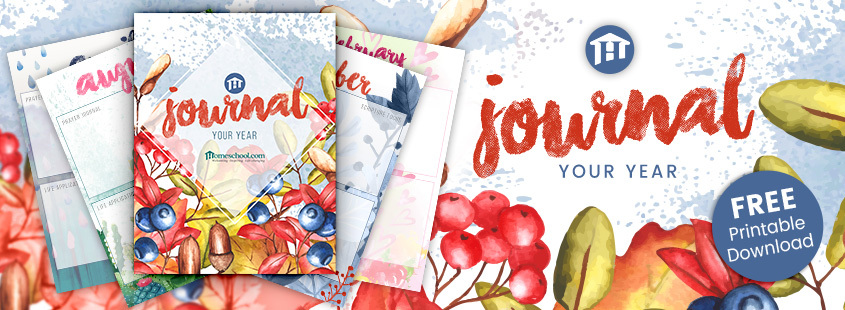Faith-Based Resource
If you’re looking for ways to get your students writing a bit more during this year, consider journaling! Our journal download can be used for a faith-based exercise each morning, or it can be used for creative writing. In fact, we’ve used journaling in our own homeschool and have it to be beneficial and helpful for exercising the art of creative writing.
Benefits of Journaling
Journaling is a simple writing exercise that provides many benefits for all ages and writing levels. Here are just a few of the potential rewards:
- Build Writing Skills: Writing daily will build writing skills as your kids practice putting together sentences, wrestling with word combinations, spelling words, and choosing punctuation. Additionally, they may even ask you for vocabulary words (“another way to say ___”) or whether something they have written “makes sense.”
- Establish a Love for Writing: Kids who journal daily may develop a love for writing. They often find that they like expressing themselves, having an audience (for their writing, or for their reading if they later read their journals aloud), or illustrating their writing, etc.
- Increase Mindfulness: Kids who use journaling to reflect on what is happening in their lives may develop attitudes, awareness, clarity, and other benefits of mindfulness.
- Start a Lifelong Habit: Journaling can be an activity that kids carry through to their adult lives. Therefore, many adults who journal started as kids continued/returned to journaling as adults.
Homeschool Journaling Builds Skills
You don’t want journaling to feel like schoolwork. However, you also don’t want to waste teachable moments. How can you design journaling activities and use completed journals to build writing skills? Here are a few suggestions:
- Design Targeted Journaling Activities: Perhaps you notice that your child writes very simple sentences. Challenge him/her to write some sentences with at least a certain number of words. Likewise, if you notice your child’s writing doesn’t include a lot of adjectives, have your child describe their favorite playground. Additionally, you can take a writing challenge, and turn it into a fun topic or prompt for journaling.
- Have Them Read Aloud: Ask your kids if they want to read their journals to you (and to each other). Sometimes, kids get so excited about sharing their stories and accounts of their summer activities that the thought of eventually reading aloud motivates them to write more.
- Follow-up with Fun Activities: Notice what writing challenges are occurring, and create some fun skill-building activities to help with those challenges. For example, if your child has difficulty with spelling, use sidewalk chalk to practice words (and then have him/her draw the pictures). If your child has trouble with parts of speech, toss a ball back and forth, each of you listing a verb every time you throw the ball.
- Keep a Record of Challenge Areas: Even if you can’t address writing challenges right away, make a note of areas to target once homeschooling starts again. You can always use a completed journal to teach formal lessons later.
Types of Journal Entries
There are many methods of journaling, so consider what you know about your kids and then choose the best type. You can also vary the methods of journaling to keep the experience interesting. Here are several kinds of journal entries that may make summer writing an easier sell:
- Log: Have your kids keep a daily log of their summer activities. This can be a fun memory book later, especially if they add illustrations. Encourage your kids to include as many details as possible and to share their reactions to the daily activities.
- Diary: Have your kids reflect on each day, or write about their thoughts and feelings. This is a more private type of writing and should remain so, but it’s still writing. There are many emotional benefits that can result from writing in a diary as well.
- Communication: Have your kids write to a particular audience (even you!). You can even write back after a certain number of journal entries. For more creativity, have your kids write to their favorite character, sports icon, etc.
- Prompt-Led: Give your kids a series of prompts that change daily/weekly and offer choices. For example, a weekly list may include writing to their own nose, writing a story about an elf on the moon, and describing their dog to their neighbor’s cat. Have fun with these!
Use our Scripture Writing Full-Year Copy Work Download as your writing prompts!
Additional Journal Ideas
Journal Your Way to Stress-Free Writing
Free Joyful Homeschooling Book and Journal!




